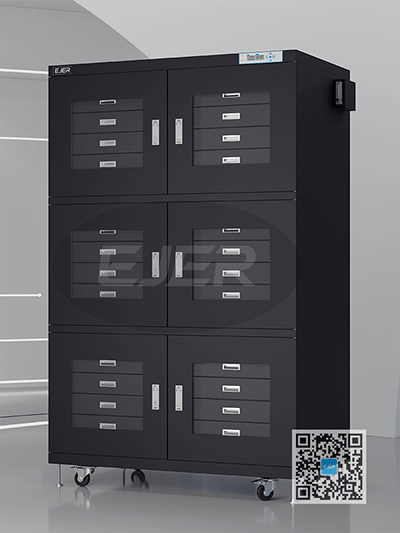Article Details
There are many kinds of dry cabinet currently in the market ,their dehumidifying principle is different, price is different, of course quality is different, so how can we distinguish them out? Today we will help you in this field:
1.Traditional dehumidificationThe basic dehumidification principle of dry cabinet adopts “zeolites” or “molecular sieves” as the dry unit of moisture absorption combined with metal or humidity sensors. Due to the saturation of hygroscopic materials, domestic and foreign brands that can be seen in the market need to have a regeneration cycle to “activate” its hygroscopic function. In general, 3 hours is the “moisture absorption” cycle, and 1 hour is the “regeneration” cycle. It runs again and again. Due to the need to dry and regenerate and stop dehumidification after saturation, the humidity in the cabinet will rise and fluctuate in a specific temperature and humidity environment. 2.Vacuum dehumidificationVacuum the drying cabinet to achieve the purpose of removing moisture. It is composed of cabinet and vacuum pump. Due to the vacuum status in the cabinet, the water content in the internal air is very low. However, the requirements for atmospheric pressure and sealing of the cabinet and door are very high, and compared with the external size of the cabinet, the internal effective use space is smaller. And can only be realized in a small cabinet, the use of vacuum, the removal and release of articles must be reduced, it is not convenient to use, and the continuous noise emitted by the vacuum pump is disturbing, and the purchase cost is expensive. At present, this method is not widely used.3.Nitrogen dehumidification
2.Vacuum dehumidificationVacuum the drying cabinet to achieve the purpose of removing moisture. It is composed of cabinet and vacuum pump. Due to the vacuum status in the cabinet, the water content in the internal air is very low. However, the requirements for atmospheric pressure and sealing of the cabinet and door are very high, and compared with the external size of the cabinet, the internal effective use space is smaller. And can only be realized in a small cabinet, the use of vacuum, the removal and release of articles must be reduced, it is not convenient to use, and the continuous noise emitted by the vacuum pump is disturbing, and the purchase cost is expensive. At present, this method is not widely used.3.Nitrogen dehumidificationNitrogen drying is widely used in the production area in microelectronics industry, and it is used more in ultra-low humidity and anti-oxidation purpose. Its drying is achieved by filling the sealed cabinet with nitrogen to replace oxygen-containing air. The main problem with the use of nitrogen cabinets is that the operating cost is too high.
Hot Recommendations
Fatal error: Uncaught mysqli_sql_exception: You have an error in your SQL syntax; check the manual that corresponds to your MySQL server version for the right syntax to use near 'and lang='en' passed=1 and bigclassname='n3' and hot=1 and st_id='s1' order by i' at line 1 in D:\wwwroot\enweb\web\dry-cabinets\articledetail.php:147
Stack trace:
#0 D:\wwwroot\enweb\web\dry-cabinets\articledetail.php(147): mysqli->query('select * from n...')
#1 {main}
thrown in D:\wwwroot\enweb\web\dry-cabinets\articledetail.php on line 147


